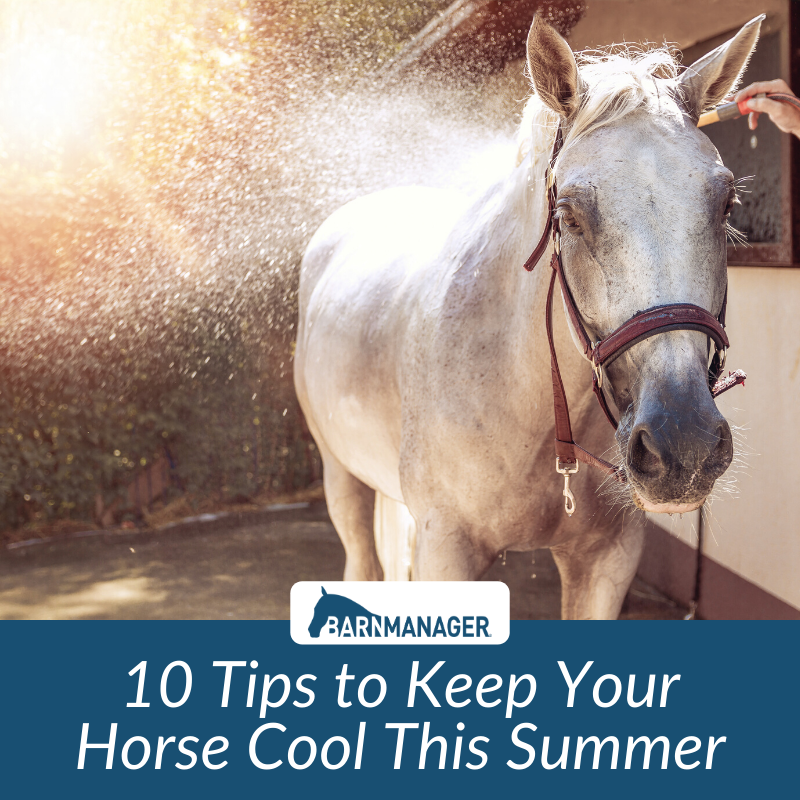
10 Tips to Keep Your Horse Cool This Summer
The summer is a fun time to ride and a great time to clock more hours in the saddle, but the summer heat can also be tough on our horses. As the temperatures are heating up, here are 10 tips for cooling down!
 1. Adjust your horses’ turnout routines to accommodate the temperatures. – If your horse is normally kept inside overnight and turned out during the day, you may want to consider swapping your turnout schedule. This allows your horse to avoid being outside in the heat of the day (and to escape the worst of the flies).
1. Adjust your horses’ turnout routines to accommodate the temperatures. – If your horse is normally kept inside overnight and turned out during the day, you may want to consider swapping your turnout schedule. This allows your horse to avoid being outside in the heat of the day (and to escape the worst of the flies).
However, it’s also important to know the property. If the turnout area is particularly shady and breezy, but the barn doesn’t allow air to circulate well, you’ll likely want your horses turned out during the day.
2. Do your best to beat the bugs. – If your horse is constantly battling bugs and flies, they’re more likely to heat up! For in the barn, consider traps or spray systems. For your horse, and for fly-sensitive horses in particular, fly masks or fly sheets may be a worthwhile option. (They even make fly sheets with cooling technology!)
3.Ensure that you horse always has plenty of water and do your best to observe their water consumption. – Keeping your horse hydrated is even more important, and more difficult, in high temperatures. When not being ridden, make sure that horses have access to water at all times, and do your best to monitor how much water they are taking in. If you’re concerned about a horse’s water intake, you can “sneak” more water in by soaking the horse’s hay.
To quickly check your horse’s hydration, pinch a bit of skin on the horse’s neck. If it does not snap back within a few seconds, the horse could be dehydrated.
4. Add electrolytes. – If you do suspect that your horse is dehydrated, an electrolyte paste can be a fast-acting, temporary solution. For horses that are working out and sweating, electrolytes can help replenish the sodium and additional nutrients lost through sweat. Powdered electrolytes can easily be added to a horse’s morning meal, and even powdered Gatorade can often fit the bill.
5. If you’re utilizing a water trough, add frozen gallon jugs of water to act as ice cubes. – The cooler water helps regulate your horse’s temperature from the inside out.
6. Utilize fans (with caution). – Installing or placing in the barn aisle or stalls can greatly help airflow, but dirty or poorly-installed fans can also present a fire hazard. If you’re running a large number of fans to stalls, be sure to consult an electrician to ensure that the barn’s wiring can handle the increased use of electric. And no matter where or how you’re using the fans, it’s wise to ensure that they are built to automatically switch off if the fan begins to overheat.
7. Plan your ride times accordingly. – This one is likely common sense, but it’s best to avoid riding at the heat of the day. (This is not only beneficial to your horse, it’s more enjoyable for you as the rider!)
8. Take your horse’s fitness level into consideration. – While a fit horse may be better able to handle the heat, a horse that is only ridden once or twice a week or on the weekends is more likely to experience heat-related issues. Take this into consideration when working your horse in the heat and plan your rides accordingly.
9. Know what’s normal for your horse. – In addition to know your horse’s fitness level, now is the time to get familiar with your horse’s vital signs if you are not already! Temperature, pulse, and respiration rates can vary slightly from horse to horse, so knowing what’s normal for your horse is important to then being able to identify what’s abnormal. To learn more about taking your horse’s pulse, temperature, and respiration, check out this article from ProEquineGrooms.com.
10. Devote extra time to cooling down after exercise. – After riding in the heat, it’s important to take plenty of time allowing your horse to cool down and to take extra measures to do so.
Many of us likely grew up hearing that you shouldn’t hose a hot horse with cold water, as it could lead to tying up and muscle cramps – but did you know that’s a myth? Hosing your horse off with cold water after exercise can actually be extremely beneficial, and running cold water over the jugular grooves of the neck and the lower legs can cool the superficial blood vessels located there. Those blood vessels will will then carry the cooled blood throughout the horse’s body.
While implementing these tips for your horse, don’t forget to also take the same considerations for yourself to keep yourself cool, healthy, and hydrated!